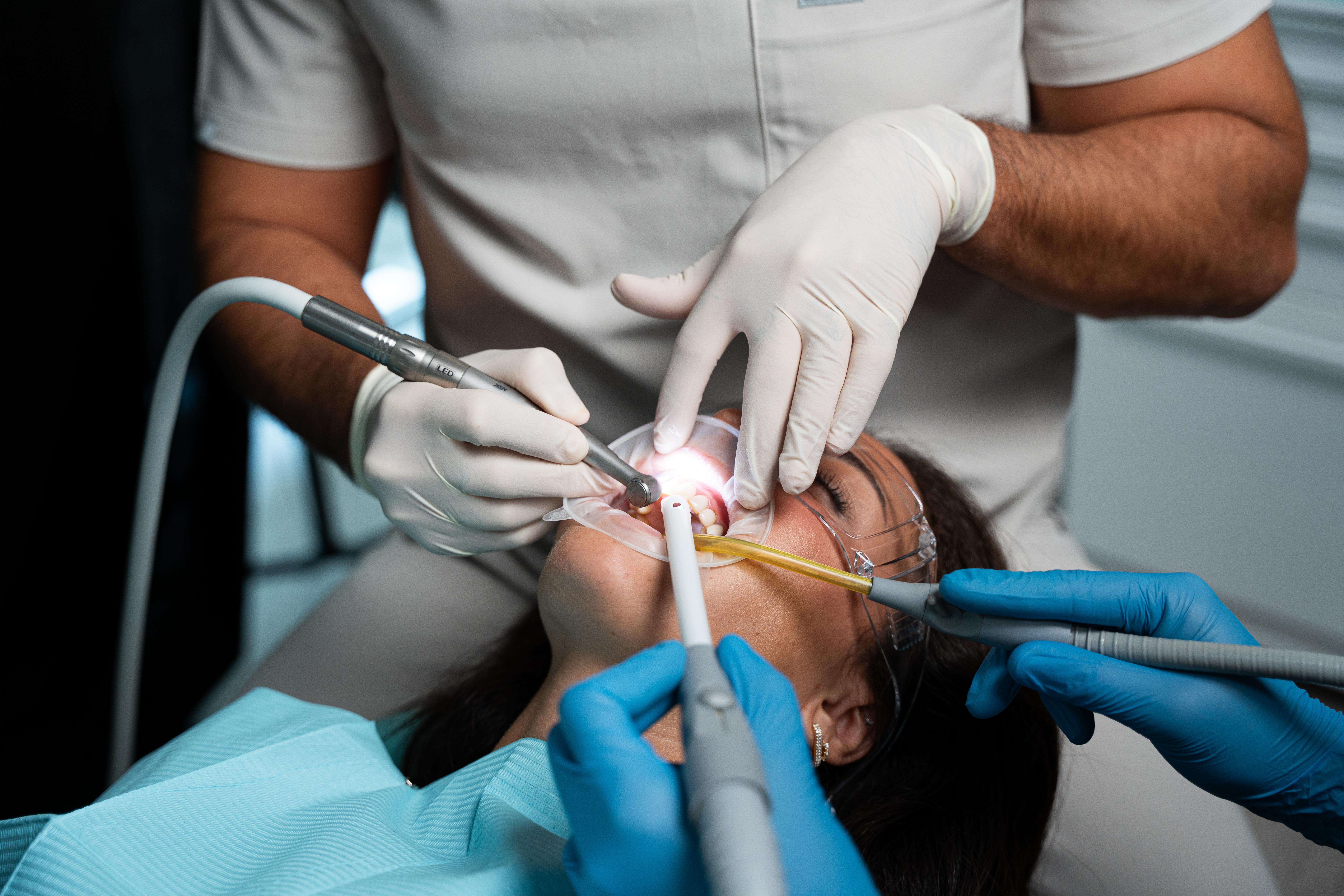Your teeth can make a world of difference to your appearance. A chip or fracture in your teeth impacts not just the aesthetics but can also lead to infections and complications.
Broken teeth must not be ignored, regardless of their severity. If your teeth appear broken, report to the dentist immediately for the best possible cosmetic treatment.

What causes teeth to break?
Several factors can result in broken teeth:
Accidents and falls can damage teeth, causing them to chip or fracture.
Chewing on ice, hard candies or opening a bottle with your teeth can cause them to crack, chip or fracture.
Teeth weakened by decay, large fillings, or damage from improper dental work in the past are more likely to break.
Grinding or clenching of teeth due to habit (bruxism) can wear your teeth down, often resulting in fractures.
Signs you need treatment for a Broken Tooth
Identifying a broken or chipped tooth is essential for timely intervention. A few signs and symptoms that your broken tooth requires treatment include:
- Evident cracks, chips, or discolouration
- Pain on chewing or biting
- Sudden sensitivity to hot or cold foods
- Swelling or bleeding around the affected tooth
- Persistent discomfort even without chewing
- Increased pain in the affected tooth when lying down
If you experience one or more of the signs and symptoms mentioned above, you may have a broken tooth or teeth that require treatment.
How do you care for a chipped tooth before your dentist appointment?
If you notice your tooth is broken, chipped or fractures, visit your dentist as soon as possible to prevent further damage or risk of infection. Here are a few self-care measures to manage a broken tooth till your dentist appointment:
- Take a pain-relieving medication if your tooth is painful.
- Eat only soft foods and avoid biting down on the broken tooth
- If your tooth has a sharp edge, use a sugarless gum or small piece of paraffin wax to cover the jagged edge.
Broken Tooth treatment options: Dental bonding, crowns, and more
There is a solution for every oral health problem in dentistry, and broken teeth are no different. Dentists evaluate the affected teeth to analyse the extent, type and severity of the condition and recommend the most suitable treatment for you
If a small piece of your tooth or teeth has been chipped off, your dentist will most likely repair the damage using a tooth-coloured resin-based filling (composite), a process called dental bonding. This is also the treatment of choice when a crack or chip is in the front tooth or is visible when you smile.
Here’s what happens during a dental bonding procedure:
- Dental bonding does not require anaesthesia
- The dentist first cleans the chipped/cracked tooth and etches the surface with a liquid or gel. This step makes the tooth surface rough, enabling the bonding material to stick to it.
- An adhesive material is then applied to the roughened tooth surface, followed by a tooth-coloured resin material. A UV light is used to harden the material.
- After the material has hardened, the dentist will shape the tooth and polish it to give it a natural look.
Dental bonding is minimally invasive, quick, affordable and long-lasting with proper care.
During your first visit, the dentist will take x-rays to check for the roots and surrounding bone and determine if the tooth needs a filling or a crown. If the tooth has decay or a minor fracture, a dental filling is recommended to restore the damaged area and prevent further deterioration.
If the tooth needs a crown, here’s what you can expect during the procedure:
- The dentist will numb the tooth and shape it to make room for the crown. If the chip or break is significant, the dentist will place a filling material to build the tooth crown.
- In the next step, the dentist will use a rubbery putty material to make an impression of your prepared tooth and the opposite tooth. These impressions/measurements are sent to the dental laboratory to fabricate a dental crown.
- In the meantime, the dentist will fabricate a temporary crown that is placed on your prepared tooth till the permanent crown is fixed.
- In the next visit, the dentist will remove the temporary crown and place the permanent crown.
A dental crown (also called a tooth cap) is preferred when a large piece of the tooth is broken and the remaining tooth requires support. Crowns not only support and strengthen the remaining tooth but also help restore its form, function, and aesthetics.
Crowns are made of porcelain, ceramic, or metal. All-metal crowns are the strongest and are preferred for use in back teeth. Porcelain and resin crowns are tooth-coloured and, therefore, are the preferred choice in the upper and lower front teeth regions.
How many sessions are needed for a crown procedure?
It takes 2-3 visits to get a dental crown.
This is a specialised dental procedure used to treat broken teeth that have affected the nerve (the crack in the tooth reaches the innermost layer called the pulp). During this procedure, the dentist removes the damaged pulp, cleans and seals the tooth’s interior. This must be followed by crown or bridge placement to strengthen the tooth and restore its aesthetics.
Veneers are thin, customised ceramic shells that are applied or stuck to the front surface of teeth. They are popular aesthetic treatments for individuals who wish to whiten their teeth or change their shape or alignment.
However, veneers are also used to treat broken teeth. They provide a natural and uniform appearance, can cover severe discolouration, cracks, and chips, and require minimal removal of tooth enamel.
If your teeth are broken or damaged, they may require removal. A dental implant is a long-term and reliable replacement option.
Which Broken Tooth treatment is right for you?
Here are a few factors that your dentist will consider and evaluate to determine which treatment is the best for your broken teeth:
- If the damage affects chewing or causes pain, you may need a root canal treatment followed by the placement of a dental crown.
- If there is a minor break or crack in the front teeth, aesthetics is the top priority, and veneers, cosmetic bonding, and crown placement are good options.
- The durability of the treatment is also a key factor in determining the type of treatment.
When you visit the dentist for a broken tteeth, they will perform a thorough oral examination and take a few X-rays. They will also evaluate your signs and symptoms and discuss any concerns you may have. Based on the abovementioned factors, your budget and your needs, the dentist will recommend the most suitable treatment option.
Preventing future damage: Tips for protecting your teeth
While accidents happen, there are many steps you can take to reduce the risk of breaking your teeth. These include–good oral hygiene practices and avoiding habits that may contribute to tooth damage.
Proper oral care and hygiene practices
- Brush and floss daily
- Use fluoride toothpaste to strengthen enamel.
- Make regular visits to your dentist for checkups and cleaning
Avoiding habits that contribute to tooth damage
- Chewing on hard objects.
- Wear a mouthguard if you have bruxism
- Reduce and limit consumption of sugary or acidic foods that weaken enamel
Conclusion
Broken teeth can be distressing, but modern dentistry offers a wide range of treatments to restore their function and appearance. Whether you need a quick fix or a long-lasting solution for your broken teeth, consulting with a dentist will help determine the best course of action. By practising good oral hygiene and avoiding harmful habits, you can also protect your teeth from future damage.
If you have accidentally broken your teeth or have a chip, crack, or fracture that is affecting your ability to chew or your aesthetics, schedule your consultation at Hortman Clinics, Dubai, today!
HORTMAN CLINICS NEWS
Related News
We are here for you. Always.
Everything we do is tailored to your needs, this is why we take our time to take care of you and answer all your questions.




